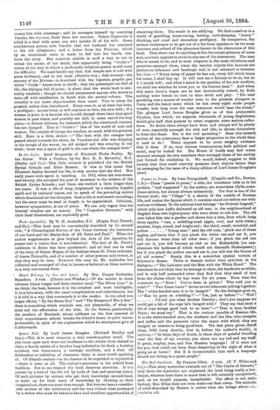Poems in Prose. By Ivan Tonrgueneff. (Cnpplin and Co., Boston,
U.S.)—These "poems in prose," a title, the translator tells us in his preface, "half suggested" by the author, are sometimes idylls, some- times satires, but almost always melancholy. The first is one of the former kind ; the " Village" is a sketch of the outside of Russian life, and makes the figures which it contains stand out before one with curious vividness. To the satirical kind belongs "An Oriental Legend," which tells how Jaffar delivered an old man in the neighbourhood of Bagdad from two highwaymen who were about to rob him. The old man takes him into a garden and shows him a tree, from which hang three apples, "one, a middling-sized apple, oval, and milk-white ;. another, large, round, and bright-red ; the third, small, wrinkled, and yellow ' Young man !' said the old man, pluck one of these apples, and know that if you pluck the white one and eat it, you will become wiser than all other men ; if you pluck the red one and eat it, you will become as rich as the Rothschilds [an ana- chronism the boldness of which would not discredit Shakespeare]; but if you pluck the yellow one and eat it, you will win the favour of all old women." Surely this is a somewhat cynical version of Solomon's dream. There is despair rather than cynicism in his dialogue,—" The Labourer and the Man with the White Hand." The labourers do not think that he belongs to them, his hands are so white, and is only half persuaded when they find that they smell of iron from the chains which he has worn for six years. Even then the comment is,—" How ? You've been in prison ? Who told you to rebel ?" " Two Years Later" shows us two labourers talking together. The "white-handed man is to be banged." So the dialogue goes on, —" Has be gone on rebelling ?"—" Yes, just as before !"—" Well r I'll tell you what, brother Dimitry ; don't you suppose we could get a bit of the rope he's hanged with ? They say that such a bit of rope brings good lack to ns here."—" That is true, brother Peter ; we must try." That is the curious parable of Russian life. It is the white-banded men, the students and the like, who conspire and suffer, and the peasants value the ropes with which they are hanged as charms to bring good-luck. The last piece given, dated June, 1882 (very shortly, that is, before the author's death), is curious,—" In these days of doubt, in these days of painful brooding over the fate of my country, you alone are my rod and my staff. O great, mighty, true, and free Russian language ! If it were not for you, how could one keep from despairing at the sight of what is going on at home ? But it is inconceivable that such a language should not belong to a great people."


































 Previous page
Previous page